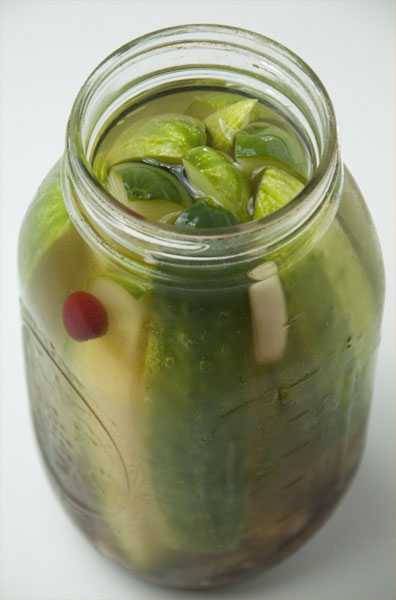The different pickling methods
1) Refrigerator Pickles. This method is simple. You simply pack the pickles in a bottle with a brine and store them in the fridge for a few days and eat. Some are ready in 24 hours. They keep for 2 months or so in the fridge. Click here for my recipe for Quick & Easy Refrigerator Kosher Dill Pickles. Here’s my recipe for Sweet & Sour Pickle Chips for Sandwiches.
2) Quick Process or Fresh Pack or Heat Processed or Canned Pickles. In order to store pickles at room temp, pickles must be pasteurized. The jars are sterilized before filling, the pickles are usually packed with a salt brine, vinegar, and spice mix, they are packed in special bottles with special lids, and then they are submerged in boiling water for a precise time. The contents are not only pickled but cooked, which changes their flavor and texture. This is how grandma stored veggies in the basement for the winter.
3) Fermented Pickles. Fresh sauerkraut and the pickles you buy from a pickle barrel are fermented in barrels or vats. The process allows bacteria to turn sugars to lactic acid. It takes time and careful control over the temperature and the bacteria that do the fermentation. It can be done at home, but it’s tricky.
4) New Pickles or Overnight Pickles. These are among my faves and they are by far the easiest. When you are done with a jar of pickles, the brine has been diluted a bit, but it is still good. Throw some fresh pickling cucumbers or green tomatoes in the brine for at least one day. Pickling cukes are a special small breed that you can find in many groceries in the summer, and I quarter them into spears. They will soak up the brine, remain bright green and crunchy, and taste just like store-bought for up to two weeks. Better. You can’t keep them for long because the brine isn’t full strength, nor do you want to. It is the fresh new flavor that makes them charming. Just don’t try to use a brine twice.
Some other pickle lingo
Pickling Spices are a blend of spices, differing from packer to packer, and can include allspice, bay leaves, black peppercorns, cardamom, cinnamon bark, cloves, coriander seeds, dill seeds, ginger, hot pepper flakes, juniper berries, mace, and mustard seeds.
Genuine Dills are made by fermentation with dill weed or dill oil added during the fermentation
Kosher Dills have garlic added. They may not, in fact, be made according to kosher laws, but they are said to be kosher style.
German-Style Dill Pickles are cucumber pickles that not fermented, don’t use a salt brine, but are cured in vinegar or lemon juice.
Sweet or Sweet-Sour Pickles have both sugar and vinegar in the packing.
Gherkins are a special small variety of cucumber, and they can be made either sweet or sour, they are usually sweet in the US.
Sweet/Hot Pickles are sweet and amped up with hot peppers.
Bread & Butter Pickles or Pickle Chips are usually sweet/sour pickled cukes sliced crosswise into coins for sandwiches. Click here for my recipe for Instant Sweet Sour Sandwich Pickle Chips.
Half Sours are refrigerator pickles made without vinegar and have been aged for about two weeks. They are usually brighter green and very crunchy.
Three quarter sours are the same as half sours, but they have just been stored longer, usually about a month.
Sour Pickles are the same as half sours, but they have just been stored about three months.



High quality websites are expensive to run. If you help us, we’ll pay you back bigtime with an ad-free experience and a lot of freebies!
Millions come to AmazingRibs.com every month for high quality tested recipes, tips on technique, science, mythbusting, product reviews, and inspiration. But it is expensive to run a website with more than 2,000 pages and we don’t have a big corporate partner to subsidize us.
Our most important source of sustenance is people who join our Pitmaster Club. But please don’t think of it as a donation. Members get MANY great benefits. We block all third-party ads, we give members free ebooks, magazines, interviews, webinars, more recipes, a monthly sweepstakes with prizes worth up to $2,000, discounts on products, and best of all a community of like-minded cooks free of flame wars. Click below to see all the benefits, take a free 30 day trial, and help keep this site alive.
Post comments and questions below
1) Please try the search box at the top of every page before you ask for help.
2) Try to post your question to the appropriate page.
3) Tell us everything we need to know to help such as the type of cooker and thermometer. Dial thermometers are often off by as much as 50°F so if you are not using a good digital thermometer we probably can’t help you with time and temp questions. Please read this article about thermometers.
4) If you are a member of the Pitmaster Club, your comments login is probably different.
5) Posts with links in them may not appear immediately.
Moderators